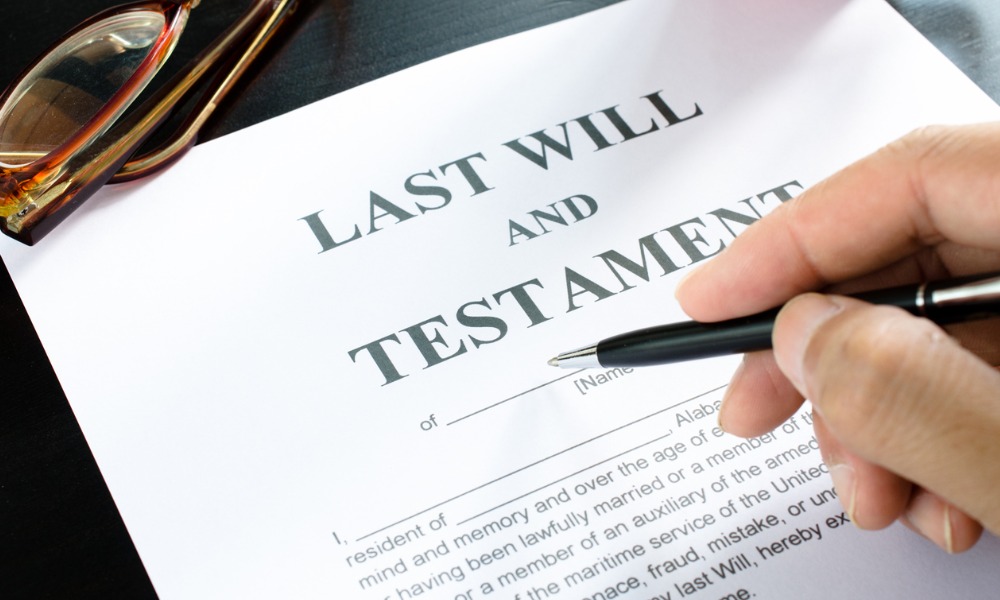The testator transferred his farmland to his neighbours on the eve of his death

The Saskatchewan Court of King’s Bench has rejected a request for disclosure of the deceased’s medical records in a lawsuit involving a challenge to the testator’s will.
In Stradeski v Kowalyshyn, 2023 SKKB 177, Jerry Wionzek transferred farmland to his neighbours, Nick and Debbie Kowalyshyn, making them the sole beneficiaries of his estate and executors of his last will and testament. Wionzek's only sibling, Pamela Stradeski, commenced an action against the Kowalyshyns to set aside the will and transfer of land, alleging that her brother did not have the requisite capacity to effect either.
Jerry Wionzek was born in 1955 and spent his life on the family farm near Rama, Saskatchewan. Pamela Stradeski was adopted by the Wionzek family. She moved away from the family farm in 1995 but eventually returned to Saskatchewan in 2015.
Stradeski described her brother's impoverished lifestyle, including poor running water and hygiene. According to her, Jerry was unkempt and unable to maintain his personal hygiene. She stated that her brother could not manage the farm after their father died in 1995 and, consequently, entered lease arrangements with neighbours.
Stradeski learned that the Kowalyshyns rented Wionzek's land but believed rent was minimal and sometimes unpaid. Key affidavits from individuals who interacted with Wionzek in his final days presented contrasting perspectives on his mental and physical condition. Some witnesses asserted that Wionzek was coherent and mentally sound, while others claimed he was confused and incapable of making informed decisions.
The Kowalyshyns stated that when Wionzek learned of his cancer diagnosis in 2019, he told the Kowalyshyns that he would leave his estate to them. Wionzek later said to them that he wanted to add them as joint owners on the title to his land. The Kowalyshyns did not observe Wionzek to be confused at any time and denied any suggestion that he did not understand what he was doing.
The Kowalyshyns further alleged that Wionzek was "firm" in his instructions not to tell Stradeski anything about this medical condition and that she would receive nothing from the estate. Wionzek's attending physician also testified that the deceased said to her that the Kowalyshyns were "the only people whom he considered to be his family and whom he trusted absolutely."
Disclosure of medical records
Stradeski filed her initial legal action in July 2020, in which she sought to nullify the land transfer and compel that the will be proved in solemn form. In 2022, Stradeski brought an application seeking an order compelling the Saskatchewan Health Authority (SHA) to disclose Wionzek's medical records.
Stradeski argued that Jerry Wionzek's medical records were necessary to establish the will's validity and the circumstances surrounding the land transfer. She invoked Rule 5-15 of The Queen's Bench Rules to request these records from the SHA, asserting their relevance to the case and acknowledging their sensitive nature.
The Kowalyshyns contended that if Stradeski wished to have the will proved in solemn form, she must first satisfy Rule 16-46 by bringing a chamber's application to allow a judge to determine whether she has raised sufficient suspicion about the will's validity. If she fails, the process ends. If she succeeds, a judge will order a trial, and the propounder of the will must prove the validity of the will by showing Wionzek had the requisite capacity to make a will.
Based on the appropriate interpretation of Rule 16-46, the application of relevant case law, and the principle of protecting an estate from unnecessary expense, the court ruled that the Kowalyshyns and SHA should not be ordered to produce Wionzek's medical records.
Protection from unmeritorious challenges
The court's decision is based on the principle of protecting estates from unnecessary expenses and delays caused by unmeritorious challenges to wills. Courts have consistently emphasized the need for an initial summary determination to ascertain whether a challenge to a will's validity has legal merit. This principle aims to prevent disgruntled individuals from burdening estates with costly and time-consuming legal disputes.
The court noted that without the constraining gatekeeping role afforded by an initial hearing, which placed an onus on the challenger of the will, the parties were immediately consigned to "lengthy, intrusive, expensive documentary collection and investigation proceedings that can last for the better part of a year or more."
Two-step process
The court highlighted the importance of adhering to a two-step process in will challenges. Initially, a determination is made as to whether there is sufficient evidence to warrant a trial to assess the will's validity. Only after meeting this minimal evidentiary threshold can the parties proceed with the discovery of documents. This approach ensures efficiency, affordability, and proportionality in estate-related disputes.
The court acknowledged the relevance of Wionzek's medical records in assessing his capacity when he executed his will. However, it emphasized that Stradeski's application for these records was premature, conflating the two stages of the will challenge procedure. The court cited Rule 5-15(1)(c), which specifies that the production of third-party documents may only be ordered when a trial is imminent, implying that the production application must occur when a trial is necessary.
Ultimately, the court decided to dismiss Stradeski's application, emphasizing that courts have struck a balance between the interests of an unhappy, disinherited person who wishes to explore the possibility of a trial to challenge the validity of a will and the interests of the executors and beneficiaries of an estate to conclude the administration and distribution of the estate. That balance has been set by the two-step proceedings, which do not include ordered production of documents from a third party.










